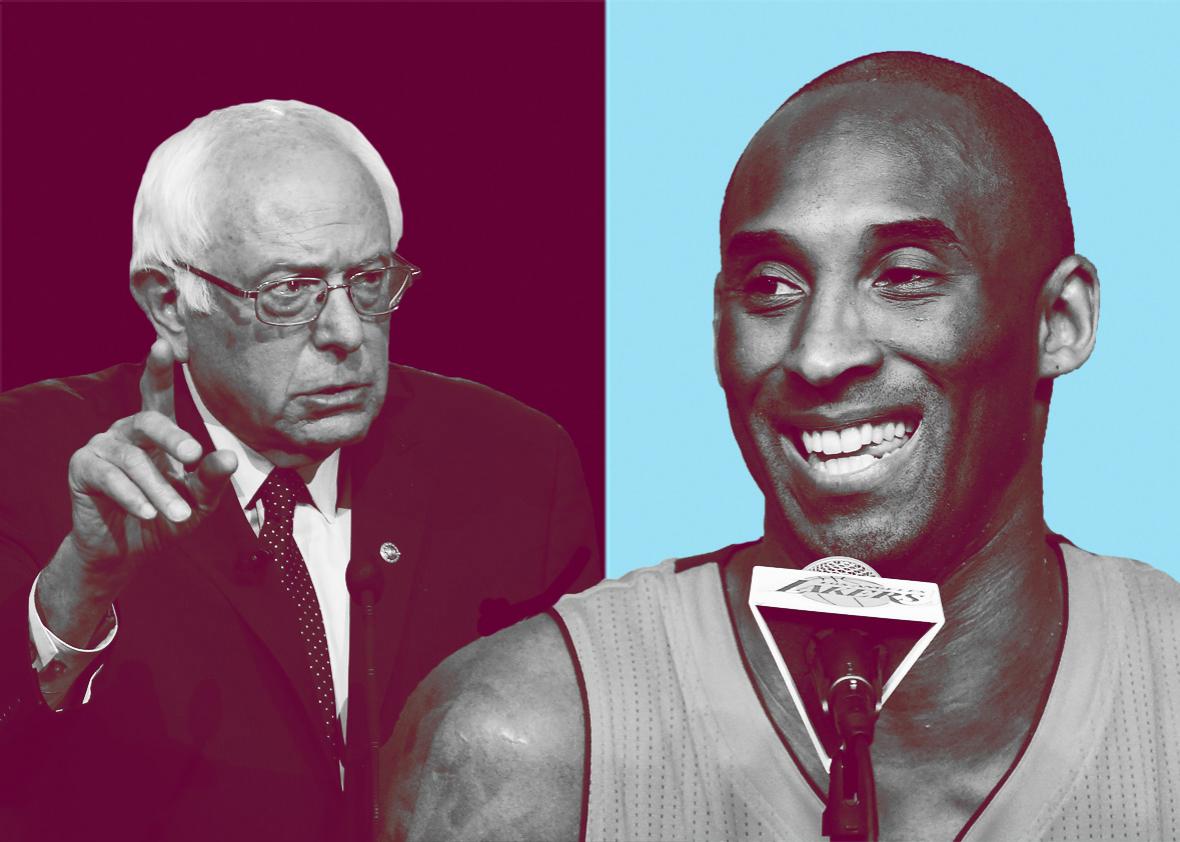Slate designer Natalie Matthews-Ramo and I got stuck in an elevator on our way out for lunch this afternoon. Everyone’s fine, but it’s surprisingly unsettling to be stuck in an elevator even for a short time. Now we’re going to have a beer and say goodbye to Laura Bradley. Lots of feelings today. Here’s some stuff to read over the weekend.
From Slate
The week’s best mea culpa is Jordan Weissmann’s acknowledgment that the argument between Hillary Clinton and Bernie Sanders is much more consequential than he thought. Isaac Chotiner had more to say about Sanders’ success at framing the debate.
The week’s best passive-aggressive superlative is Josh Levin’s summing-up of retiring Laker Kobe Bryant: “He is the greatest performer of greatness in basketball history.”
The week’s best dog-that-didn’t-bark story comes from Seth Stevenson, who points out that we haven’t seen the National Enquirer’s ballyhooed Ted Cruz takedown yet and has some suggestions as to why.
This week in pseudoscience: “Impostor syndrome” is not in fact a syndrome.
This week in centenarian heroes: Happy birthday, Beverly Cleary.
Not from Slate
“Encrypted” by Alex Ross, New Yorker
More than a century after his death, the inscrutable French poet Stéphane Mallarmé remains an enigma, his work a puzzle that only grows more vexing in translation. In this critically astute and elegantly written essay, Ross helps explain Mallarmé’s power—and revels in the challenges his poetry still presents to philosophers, translators, and readers of all stripes. —Jacob Brogan, contributor
“What Killer Mike Got Wrong About My Bernie Sanders Confrontation” by Marissa Johnson, the Establishment
You’ve probably seen the clip from last August in which two women disrupted a Bernie Sanders rally in Seattle in the name of Black Lives Matter. The rapper and Sanders supporter Killer Mike claimed that Sanders graciously conceded the stage and listened to their concerns. Johnson, one of the activists, contested that version of events on Twitter, then wrote this powerful essay about reclaiming her own narrative. —Derreck Johnson, designer
“At Tampa Farm-to-Table Restaurants, You’re Being Fed Fiction” by Laura Riley, Tampa Bay Times
This is a really great piece of reporting by a food critic. My favorite part is the guy who claims to make buffalo mozzarella from his own herd of water buffalo. When Riley confronts the restaurateur about his mozzarella’s dubious origin story, he answers her inquiries with an invitation to drink a glass of wine with him. —Dan Kois, culture editor
From the archives: Laura Bennett unearthed this “outrageous” 2009 account of Gay and Nan Talese’s marriage, which Henry Molofsky countered with this 1990 profile of Donald and Ivana Trump, which reminded Rachel Gross of Mark Singer’s 1997 Trump profile from the New Yorker.
Very Short Q-and-A
This week’s personal question is addressed to Jacob Brogan, who writes about technology and culture.
Slate Plus: You posted on Facebook that the research for your story “Don’t Anthropomorphize Inky the Octopus!” made you cry. Why? Do octopuses always make you cry?
Jacob Brogan: Evolutionarily speaking, we diverged from octopuses something like 500 million years ago. With bodies like tongues and brains that extend into their arms, it’s hard to imagine creatures more different from us. That otherness overwhelms me when I try to make sense of it, just sort of destroys my own capacity for cognition. Crying is like a release valve, a way of letting this knowledge of the aliens among us bleed out.
But I also love that some humans, the lucky ones, have been able to form connections with these creatures, mostly by trying to confront them on their own terms. There’s something deeply moving about that too, about the promise of all those entangled arms. Mostly I just think octopuses are cool, though.
Thanks, Jacob! And thank you for your Slate Plus membership, which makes our journalism possible. See you next week!
Gabriel Roth
Editorial director, Slate Plus
